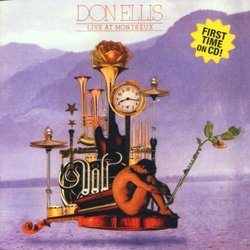| All Artists: Don Ellis Title: Live at Montreux Members Wishing: 1 Total Copies: 0 Label: Koch Records Release Date: 3/26/2002 Album Type: Live Genres: Jazz, Pop Styles: Avant Garde & Free Jazz, Modern Postbebop, Bebop Number of Discs: 1 SwapaCD Credits: 1 UPCs: 652405141026, 081227680664 |
Search - Don Ellis :: Live at Montreux
 | Don Ellis Live at Montreux Genres: Jazz, Pop
|
Larger Image |
CD Details |
CD ReviewsVintage Don Ellis - Not to be missed! David E. Jarvis | Pullman, WA United States | 05/02/2002 (5 out of 5 stars) "The Don Ellis Orchestra was one of the most important experimental big bands to come out of the 70's. No other band has ever been quite like this one. Constant meter changes, electrified strings, expanded woodwind and brass sections.....it's all here. I was fortunate enough to see this band live about 3 or 4 times and was blown away everytime. This recording has all the energy I remember of those live concerts. Granted there are places in the recording where the band almost looses control or some feedback is heard due to mic problems...but the excitment of the playing allows you to forgive these mistakes. This band was daring and never backed away from anything they played. Ellis' band gave you 120% in concert and it can be heard on this recording. It was sad that he passed away not too long after this album was recorded. I hope that Columbia Legacy and/or Koch records (Both labels which have released some of Don's big band recordings.) will follow through and release the rest of Don's great legacy. Bring on "Tears of Joy" and "Live at the Filmore"....it's time to give Don his rightful place in big band history!!" Clearing up a few issues Nick DiScala | San Francisco, CA USA | 03/31/2005 (5 out of 5 stars) "I was responsible, in good part, for the inclusion of the bonus tracks as well as the new liner notes. The initial pressing of this release (the present CD version-not the LP) had some manufacturing issues. There were one or two instances of what sounds like feedback on the first track at about the one minute mark. (I'm writing this from memory, so I may be incorrect on a few details.) Koch fixed this quickly and did another pressing. If your copy of the CD contains this squelch, you should return it and get a newer copy. Regarding the liner notes and general booklet text, there are quite a few instances of problems with formatting and omissions. The formatting of the liner notes was not what I provided. Font size, text titles that originally were not intended as titles, punctuation, removal of italics, lack of appropriate accents, etc., are some of the issues around my notes that occurred after they were handed over to Koch. An instance of an omission is that Jack Coan is not listed as the trumpet soloist on "Future Feature". I mention these only because they reflect poorly on my writing skills. The actual words were not altered. I have been assured that, should another pressing occur, the issues will be corrected. Unfortunately, I don't think this will happen as Koch Jazz exists currently only on paper. The one remaining employee I was working with is now in a different department and there are no plans to resurrect Koch Jazz as an active entity beyond managing the existing catalog. The bonus tracks were not mixed in any way for this release. They were taken whole cloth from the master tapes and included without any remastering or editing. Hence, the uneven balances both within a given track and compared to the originally released tracks. Regarding Sean's comments about the populist leanings of some of the compositions I'll say this: There's nothing inherently wrong about wanting to please your audience or writing simple melodies. (Anyone who ever tried to write a successful hook knows that "simple" is often "harder".) Think of "Milestones" or "St. Thomas", for instance. It's all in the treatment and approach. Don never uses simple materials in a simple way. There is always something about the setting that justifies the approach or the inclusion. Also, I think, these days, it is pejorative to apply the adjective "disco-influenced" (Go-No-Go). The passage Sean must be referring to is, essentially, a 4 bar B section. It is even arguable that what most people consider as disco-the "four on the floor" beat-doesn't even apply here. Without spoiling for an argument, I think Sean and I simply have different definitions of what constitutes a disco beat. The Chuck Mangione reference on "Open Wide" is valid. But as mentioned above, it's all in the treatment. Don takes a simple primary idea and surrounds it with all sorts of sophisticated, yet accessible ideas. Late in the tune, Don even acknowledges the naive predictability of the tune-especially by that point in the proceedings-by throwing rhythmic curveballs at it during his solo breaks. As for the recording itself, I really think it is representative of Don Ellis at his best. It embodies all the qualities that make you like Don and his music in the first place. When Don was at the top of his form he managed to combine mass-appeal musical ideas with high-level procedures and make it all go down easily and seamlessly. "Montreux" represents Don at the top of his form. " Excellent P. Thompson | Center Valley, PA | 04/03/2002 (5 out of 5 stars) "A tremendous album that includes live performances of tunes originally released on the Star Wars studio album. A creative mix of instrumentation that is exciting and can be poignant. I hope for more Don Ellis CD's in the future."
|

 Track Listings (9) - Disc #1
Track Listings (9) - Disc #1